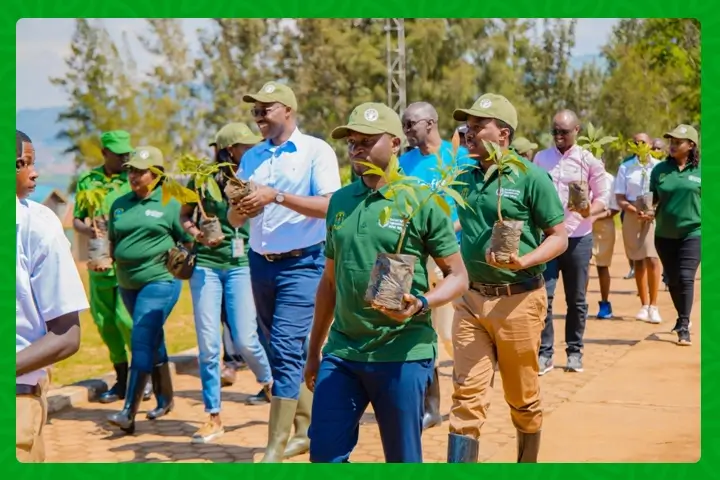
In a significant stride toward fostering sustainable agriculture and addressing food security challenges in Rwanda, the Food and Agriculture Organization of the United Nations (FAO) has embarked on an ambitious mission – planting fruit trees in 100 schools across Kigali. The launch of this transformative initiative, themed “Healthy Forest, Healthy Planet,” unfolded at Groupe Scolaire Kimironko I on November 16, with the esteemed presence of Dr. Ildephonse Musafiri, the Minister of Agriculture and Animal Resources.
Tackling Global Goals Locally
Rwanda, like many nations, grapples with the monumental task of achieving the Sustainable Development Goals (SDGs), notably SDG2, focusing on Zero Hunger. FAO, overseeing 21 SDG indicators, strategically targets undernourishment and food security, recognizing the interconnectedness of forests, fisheries, water use efficiency, women and land, public investments in agriculture, and food price volatility.
Despite commendable progress, Rwanda faces challenges in meeting SDG targets, with 80 percent of the nation currently classified as food secure. In response, FAO collaborated with the Rwandan government, engaging approximately 100 teachers and students in extensive consultations to shape the “Healthy Forest, Healthy Planet” initiative.
Bridging the Food Security Gap
“The initiative not only aims to bridge the food security gap but also serves as a platform to raise awareness about hunger and cultivate a sustainable food future,” elucidated Coumba Dieng Sow, FAO Country Representative. Recognizing the pivotal role of youth in ensuring the success of sustainable agriculture, she emphasized that the responsibility of agriculture extends beyond rural areas to encompass everyone.
Nurturing Trees, Nurturing Communities
This groundbreaking initiative stems from a recent inception workshop for the project titled “Supporting Innovative Urban Agriculture for Enhanced Food Security and Nutrition,” launched under the FAO Green Cities initiative. The overarching goal is to strengthen urban environments, foster urban-rural connections, and enhance resilience within urban food systems and communities.
“There’s no such thing as nothing in agriculture. Every planted tree counts. But planting fruit trees is even better because as we plant and nurture them, they also nurture us in return,” added Sow, capturing the symbiotic relationship between humanity and nature.

Dr. Musafiri’s Dual Impact Vision
Dr. Musafiri, actively participating in the tree-planting activity, underscored the dual impact of trees in combating climate change and ensuring food security. Encouraging youth involvement in the agricultural sector, he highlighted the untapped opportunities awaiting exploration.
Fruits of Collective Efforts
During the event, students indulged in plate-sized fruits, symbolizing the fruits of their collective efforts. Groupe Scolaire Kimironko I received commendation for its well-maintained garden and active participation in the tree-planting endeavor.
A Growing Educational Platform
As the initiative progresses, it will extend its roots to 99 more schools in Kigali. This expansion aims to provide an educational platform for teachers and students to delve into innovative and sustainable agricultural practices, gardening, and nutrition, fostering a generation equipped to address global challenges.

In conclusion, FAO’s fruit tree planting project in Kigali schools is not merely about planting trees; it’s about sowing the seeds of a sustainable and fruitful future for Rwanda. As these trees take root, so does the promise of a healthier planet and a community nourished by the bounties of nature.
Source: The New Times, written by Jade Natacha Iriza (Link)
Stay updated with the latest farming tips and agriculture industry news from Africa by subscribing to our newsletter. Don’t miss out on valuable insights and updates. Follow us on Twitter, LinkedIn, and Facebook to join our farming community and stay connected with us.



















